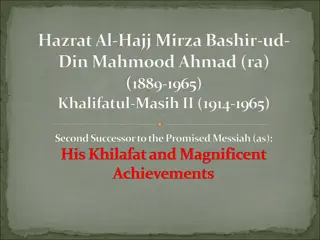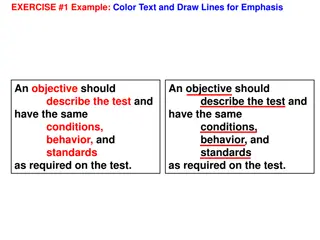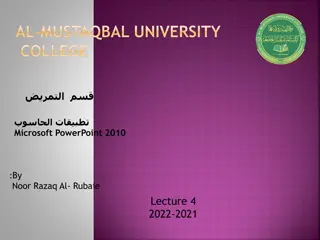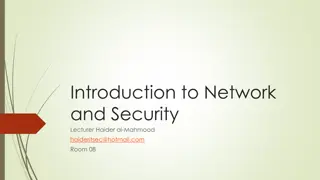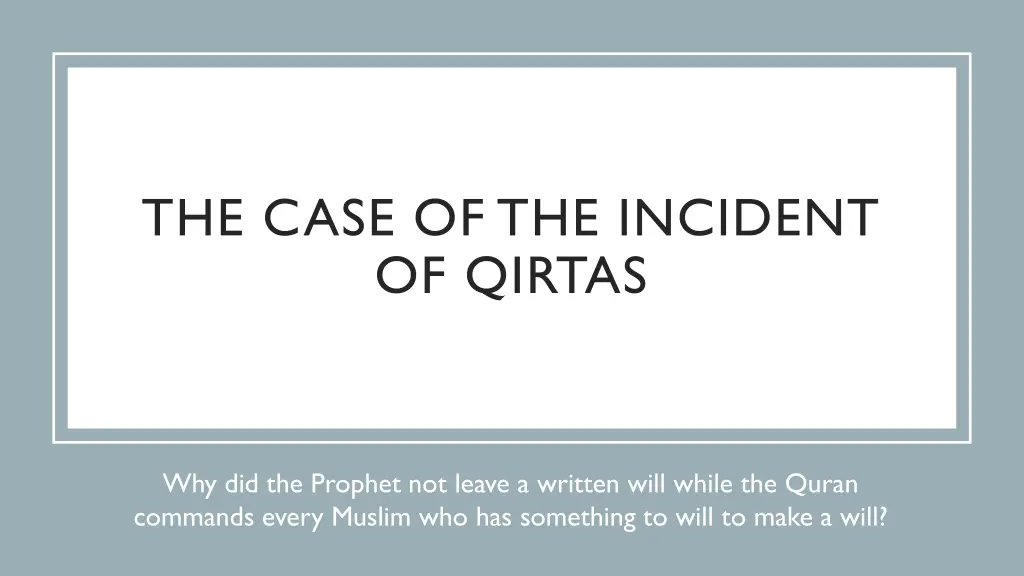
Why the Prophet Didn't Leave a Written Will: The Incident of Qirtas
Explore the question of why Prophet Muhammad did not leave a written will despite the Quran commanding Muslims to do so, delving into the incident of Qirtas and the differing views on the matter, including the Shia perspective.
Uploaded on | 1 Views
Download Presentation

Please find below an Image/Link to download the presentation.
The content on the website is provided AS IS for your information and personal use only. It may not be sold, licensed, or shared on other websites without obtaining consent from the author. If you encounter any issues during the download, it is possible that the publisher has removed the file from their server.
You are allowed to download the files provided on this website for personal or commercial use, subject to the condition that they are used lawfully. All files are the property of their respective owners.
The content on the website is provided AS IS for your information and personal use only. It may not be sold, licensed, or shared on other websites without obtaining consent from the author.
E N D
Presentation Transcript
THE CASE OF THE INCIDENT OF QIRTAS Why did the Prophet not leave a written will while the Quran commands every Muslim who has something to will to make a will?
OUTLINE An attempt to answer the question and present the Shia view and consider the following sub- questions: Was the will about succession? If so, who was it meant for? Why did the Prophet not write the will after the incident?
PREAMBLE *The topic is the final will of the holy Prophet which was not implemented * The position of making a will in the light of the Quran "It is prescribed when death approaches any of you if he leaves any valuables that he makes a bequest to parents and closest kins in the legitimate way. This is a duty of every righteous; If anyone changes the bequest after hearing it the guilt shall be on those who make the change. For God hears and knows (all things)." Q. 2:180-81
Muslim in his Sahih recorded the following: "Abu Salim reported that the Messenger said: 'A person who has something which he may will has no right to stay three nights without his written will.'" Abdullah Ibn Umar reported that the Prophet said: "A person that has something to will has no right to stay two nights without his written will." Muslim reported also that Abdullah Ibn Umar said: "Since I heard this from the Messenger of God. I never stayed one night without my written will." These three ahadith are recorded by Muslim in his Sahih Part 11 (The Book of Will) pp. 74-75. The second of them is also recorded by Al-Bukhari in his Sahih Part 4 p. 3.
THE INCIDENT : : : : : : : . Sahih Bukhari, Kitab al-ilm ch.39, hadith 114 Narrated 'Ubaidullah bin `Abdullah: Ibn `Abbas said, When the ailment of the Prophet became worse, he said, 'Bring for me (writing) paper and I will write for you a statement after which you will not go astray.' But `Umar said, 'The Prophet is seriously ill, and we have got Allah's Book with us and that is sufficient for us.' But the companions of the Prophet differed about this and there was a hue and cry. On that the Prophet said to them, 'Go away (and leave me alone). It is not right that you should quarrel in front of me. Ibn `Abbas came out saying, It was most unfortunate (a great disaster) that Allah's Apostle was prevented from writing that statement for them because of their disagreement and noise.
THE INCIDENT " " . " " . . Sahih Bukhari, kitab al-mardha, ch.17, hadith 5669
Shia Source He remained unconscious for a short time while the Muslims wept and his wives and the women and children of the Muslims, and all those present raised great cries of lamentation. The Apostle of All h, may All h bless Him and His Family, recovered consciousness and looked at them. Then he said: Bring me ink and parchment so that I may write a document for you, after which you will never go astray. Again he fainted and one of those present rose to look for ink and parchment. Go back, Umar ordered him. He is delirious. The man went back. (Later) those present regretted the dilatoriness (they had shown) in bringing ink and parchment and rebuked each other. They used to say: We belong to All h and to Him we will return, but we have become anxious about our disobedience to the Apostle of All h, may All h bless Him and His Family. When he, peace be on him, recovered consciousness, one of them said: We will not bring you ink and parchment, Apostle of All h. May All h remove him who made you say no , he said. However, I will appoint a trustee over you in a better way through my family. Then he turned his head away from the people. They rose to leave but al- Abb s, al-Fa l b. al- Abb s and Al b. Ab lib and his family, in particular, remained with him Kitab al-Irshad of Shaykh Mufid pp.126-127
OBEDIENCE TO THE PROPHET 8:24 Believers, respond to God and His Messenger when he calls you to that which gives you life. Know that God comes between a man and his heart, and that you will be gathered to Him. Q. 24:51 When the true believers are summoned to God and His Messenger in order for him to judge between them, they say, We hear and we obey. These are the ones who will prosper: 1. EVERY BELEIVER IS DUTY BOUND TO OBEY THE ORDER OF THE PROPHET WHATEVER CONDITION THE PROPHET MAY BE IN 2. OBEDIENCE TO THE PROPHET IS COMPULSORY AND UNCONDITIONAL
WAS THE WILL ABOUT SUCCESSION? BASED ON THE FOLLOWING POINTS IT WAS Established sunna of the Prophet to appoint an amir whenever he had to go out for a task for a period of time 1. When he left for Badr he appointed Abu Lubabah. 2. When he left for DoumatAl-Jendal he appointed Ibn Arfatah -When he left for Banu Quraidhah he appointed Ibn Om Maktoom. He appointed him also when he left for Thee Qirad -When he left for Banul-Mustalaq he appointed Abu Dharr -When he left for Kheibar he appointed Numailah -When he left for OmratAl-Qadha he appointed Ibn Al-Adhbat -When he left for Mecca he appointed Abu Raham -When he left for Tabuk he appointed Ali -When he left for the Valedictory Pilgrimage he appointed Abu Dujanah. Ibn Hisham, al-Tabari, al-Tabaqat ibn Sa d The Prophet had been prophesised that his ummah will be divided and kill each other Al-Hakim in his Sahih Al-Mustadrak reported that Abu Muwaihibah, a companion of the Messenger said: "The Messenger of God has told me: 'I have been ordered (by God) to pray for the people of Al-Baqee (a cemetery of Medina) for forgiveness.' 'Come with me.' I went with him. When he stood in the midst of the garves he said:"Peace be upon you people of cemeteries. Congratulations to you for what you are in.You do not know what God has saved you from. The faithtesting trials are coming as pieces of a dark night one follows another...." 2 Al-Hakim in his Al-Mustadrak Part 3 pp. 5-6. Similar references also found in Sahih al-Bukhari, vol. 4, Chapter al-Fitan, hadith no 7052, 7057, 7058, Al-Mustadrak al-Hakam, vol 4. Page 480-1 The Prophet was most higher in terms of saving his community Q. 33:6 1. LATER EVENTS PROVED THIS PROPHECY OF THE PROPHET 2. THE PROPHET BEING AS THE GUARDIAN OF THE FAITH WAS OBLIGED TO SAFEGUARD HIS NATION
Both Caliphs (Caliph Abu Bakr and Caliph Umar) were also concerned about succession Khalifa Abu Bakr s will mindful of fitnah after him dictated will Khalifa Umar s will demanded by sahaba about fitnah after him-passed on his long will which was implemented Same thing was uttered by the Prophet : I will write something for you after which you will not go astray
WHY OPPOSITION OF WILL? When is it permissible for a Muslim to prevent another Muslim from writing his will? Abdullah Ibn Umar s report The Prophet is no common Muslim Caliph Umar no common Sahabi
THE WILL WAS FOR IMAM ALI NOT FOR ANYONE ELSE The final Prophet principally belonged the great channel of prophethood So [you believers], say, We believe in God and in what was sent down to us and what was sent down to Abraham, Ishmael, Isaac, Jacob, and the Tribes, and what was given to Moses, Jesus, and all the prophets by their Lord. We make no distinction between any of them, and we devote ourselves to Him. Al-Baqara 2:136, Al-Nisa 4: 163-164,
THE WILL WAS FOR IMAM ALI NOT FOR ANYONE ELSE The Qur an has mentioned successorship of previous prophets had been within their own close family (2:136) So [you believers], say, We believe in God and in what was sent down to us and what was sent down to Abraham, Ishmael, Isaac, Jacob, and the Tribes, and what was given to Moses, Jesus, and all the prophets by their Lord. We make no distinction between any of them, and we devote ourselves to Him. Example of the prophets of Bani Israel, such as Dawud, Sulayman according to the Quran. (Al-Naml 27: 16) (27:16) In sura Maryam when prophet Zakariya longed for his successor from his children and supplicated and granted prophet Yahya. (19:4) (19:5) (19:6) (19:7)
THE WILL WAS FOR IMAM ALI NOT FOR ANYONE ELSE (KHUTBA GHADIR-3 FOCAL POINTS) Imam Ali s leadership had already been declared by the Prophet on certain occasions An objective and closer reflection of the khutba of Ghadir establishes 3 points which are inter-related, not separated : : : : . : . Mustadrak `ala al-Sahihayn Haydarabad: Da'irat al-ma`arif al-nizamiyyah(4 vols), 1334-42 AH vol. 3, p. 109 : : al- Three following parts of khutbah 1. I have more right over your lives than yourself, 2. Whoever I am Maula This Ali is also maula to him /her 3. Ahl al-Bayt/Ali and the Quran shall never be separated from one another till the Last Day. Omm Salemah (wife of the Prophet) reported that she heard the Prophet saying: " Ali is with the Qur'an and the Qur'an is with Ali.They will not part with each other until the Day of Judgement. Al-Hakim Al-Mustadrak Part 3 p. 124. : : Hadith al-Manzila Expedition of Tabuk Al-Bukhar , vol. 4, p. 208; vol. 5, p. 129, Muslim, vol. 7, p. 119 with addition of , kim al-N sab r ,Mustadrak, vol. 3, pp. 133-4; :
WAS THE WILL FOR KHALIFA ABU BAKR? Based on the following points it appears will was not directed for khalifaAbu Bakr 1. Main opposition from Khalifa Umar and his major role for the leadership of Khalifa Abu Bakr in Saqifa Al-Tabari, vol 2, pp 458-9, Sira ibn Hisham, vol 4, p 255, Ibn al-Athir al-Kamil fi al-Tarikh vol 2, pp 326-331 2. The umma was not saved from division and dispute
WHY DID THE PROPHET NOT WRITE HIS WILL AFTER THE INCIDENT DESPITE OPPORTUNITIES? Very important question I will write something for you after which you will not go astray Did he convey it? Indeed had conveyed on several occasions in clear terms and had fulfilled his task however during the remaining days he did not try and write down again explanation Haakim (who is a great muhaddith and faqih from early days -4thcentury hijra) narrates from the chain of Shurayq ibn Abdillah, from Uthmaan ibn Umar, from Shaqeeq ibn Maslamah, who narrated from the great companion Huzayfa ibn Yaman who narrated that some companions asked the Prophet: Would you appoint a khalifa for us? The Prophet replied: If I appoint a khalifa for you, you would disobey him and then the punishment would descend. They asked (again): Would you appoint Ali as a khalifa for us (that would be suitable)? The Prophet replied: You will not do it (i.e. you will not obey him). And if you did (obey him) you will find him a guide and guided and he will lead you onto the right way. Izalatul Khafaa an Khilaafatil Khulafaa, p 335 Casting doubt on the consciousness and soundness of the mind of the Prophet
CONCLUSION Last will was about succession of Imam Ali based on 3 points: 1. In line with the Quran 2. Sunna of the Prophet to appoint leaders whenever leaving Madina 3. Will was reaffirming Imam Ali according to many incidents however mainly Ghadir and hadith al-Manzila Caliphs Abu Bakr and Umar both concerned about future of Ummah and made final wills in terms of their successors The Prophet s will was stopped by stating Hasbuna Kitabullah Muslims still differed and civil wars while Quran still being there in terms of Hidaya The Prophet never attempted to dictate his will during the remaining days









